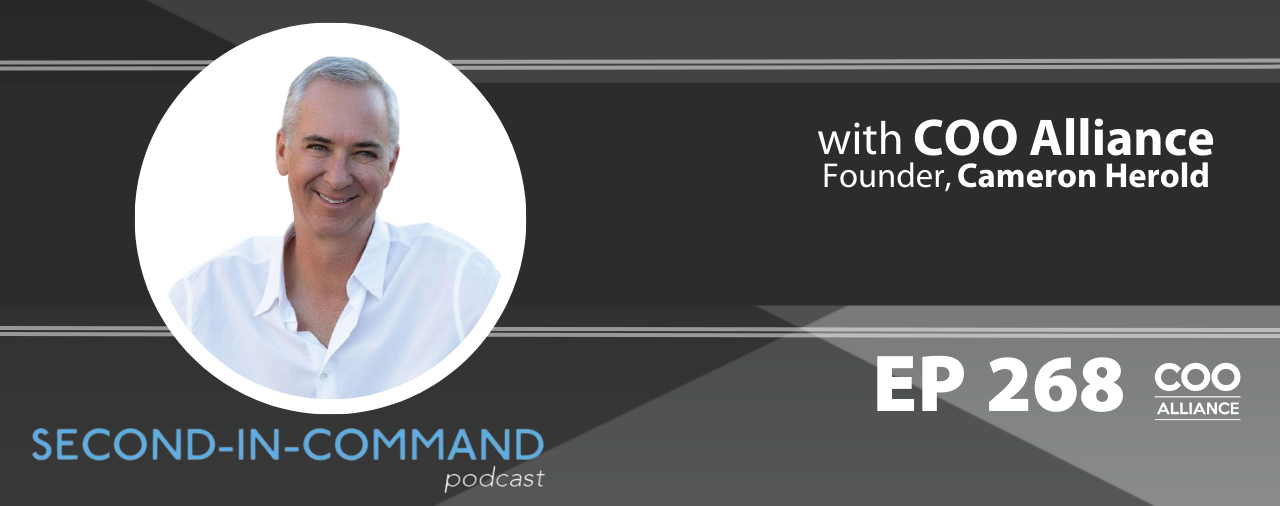Do you think out loud as a CEO? Have you ever really thought about all the business lessons you now know to be true? When Cameron was the CEO for 1-800-Got-Junk, he learned the dangers of thinking out loud, especially when coupled with a large title like CEO or COO. In today’s episode, Cameron will share some of the things he learned from his experiences, as well as his extensive journaling practice after leaving 1-800-Got-Junk. He’ll outline some of the roughly 60 lessons in business that he wishes he’d known when he was in the middle of building the company.
In This Episode You’ll Learn:
- Why the CEO should be the last person to speak in meetings.
- The importance of listening twice as much as we speak.
- Why every single action as a leader has a ripple effect.
Resources:
Connect with Cameron: Website | LinkedIn
Get Cameron’s latest book “Second in Command: Unleash the Power of your COO”
Subscribe to our YouTube channel – Second in Command Podcast on YouTube
Get Cameron’s online course: Invest In Your Leaders
—
Do you think out loud as a CEO? Have you ever thought about all the business lessons you now know to be true? Years ago, when I was the COO for 1-800-GOT-JUNK?, I learned the dangers of thinking out loud, especially when coupled with a large title like CEO or COO. In this episode, I’ll tell you what I learned. I also spent three months journaling after leaving 1-800-GOT-JUNK? and came up with roughly 60 lessons in business that I wish I’d known when I was in the middle of building the companies. I’m going to share some of those lessons with you. I hope you love this episode as much as I did creating it for you.
—
The CEO is the Chief Energizing Officer. We have to be very careful with everything we say because it gets taken with way more intent than we often anticipate it will. One of the detriments of ADD is that we think out loud. One of the detriments of the manic side of bipolar is that we’re often going so quickly that we’re thinking out loud. The problem is that when we’re thinking out loud, everyone else is internalizing those thoughts and figuring out how to make us happy. They’re searching for that praise still that we’re all starving for as kids. We’re all sixteen-year-olds trapped in adult bodies. Remember that titles carry a lot more of this unintended weight. God gave us two ears and one mouth. We need to use them in that ratio. We need to listen twice as often as we speak.

Think Out Loud: The CEO is the chief energizing officer. We have to be very careful with everything we say because it gets taken with way more intent than we often anticipate it will.
One of Simon Sinek’s books was called Leaders Eat Last. Simon was on our board of advisors. Simon actually flew out to Vancouver to meet Brian and I. He read about us in Fortune Magazine and flew to Vancouver from New York to see if it was real. That was where we first met Simon. He stayed at my house that weekend. We had lots of dinners together. He ended up on our board. His thing about the Leaders Eat Last, I’ve always said that the leaders need to speak last as well. When you’re in a meeting, the last person to be speaking should be the CEO or the most senior person. Our job as leaders is to grow people, to grow their skills, and to grow their confidence. If we’re always speaking, they’re not getting to share their ideas.
When we get them to share their ideas, we can go, “That’s amazing,” they feel good about themselves and then share more ideas. Our job is to shut up, ask questions, get them to give their ideas, and help them give better ideas. Give the quiet people a voice so they’re in the room. If you’re going to invite people into a meeting and they’re not going to speak, you shouldn’t be inviting them to the meeting. What I try to do is listen and don’t talk. For everybody in this room, Alicia, you’ll love this. Alicia Dumas helps thought leaders and authors have their books end up on the Wall Street Journal bestseller lists. I don’t know who you’re working with, but I think you know Alicia. I’m sure you do. Alicia Dumas over here helps a ton of the best authors in the world get their books on the biggest lists in the world.
Who here has written a book? Who here has written two books? If you haven’t written a book yet, you should. There’s been no easier time in history to get a book written. I’m working on my sixth book right now and it’s called The Second in Command. It’s how to unleash the power of a COO because that will drive the COO Alliance and it’s a way for me to share all my ideas finally. Also, I get all the ideas out of my head. I work with a group called Scribe. I’m the number one referral source to Scribe. If you want an introduction to them, you can send me an email. It’s Cameron@CameronHerold.com. I’ll introduce you to my team and they can help you with it. It’s not cheap. It’s about $40,000 to get your book done. Here’s how the process works.
I do about six hours in six Zoom calls where they ask me questions and I talk. I keep talking and I walk around my home talking and they get all this content transcribed. I send them videos from my speaking events, stuff I’ve written, and coaching calls. They pull all those transcriptions together and start framing it into this book. They keep asking me questions and I go through and read it.
My total time commitment for my CEO/COO book will be about 30 hours. My total time commitment for the book Vivid Vision was eighteen. It’s a good book because they do all the post-production, the pre-press, and the rounds of editing. It’s all me. It’s all my content. It’s all my words. For me to sit down and type it, I suck at typing. I suck at writing. It would take me forever. To get that book out there, that fuels everything. That’s where my speaking fees went from $3,000 to $40,000. My coaching fees and brand awareness jumped. It’s all because of that. You can do it in cheaper ways as well, but this is an example of what you can do.
I had to learn that my mania is good when I harness it, but there are lots of times when I need to slow down and be a little bit less manic. I had to be able to find ways to be a little bit less manic so that my team didn’t feel like I was coming at them with 70 ideas. The classic for me was if I would go away to like a YPO event, an Entrepreneur’s Organization event, or a Genius Network event, and I would come back with these 64 great ideas that I had, I was all filled with energy, and I wanted to share them all.
My team was in full-on panic mode because they think that they have to now work on those 64 ideas. Some of them all think those are terrible ideas, but I was so excited I had to share them. By slowing down and being less manic, it allowed me to then work better and better with the team. I had to learn to think before speaking, which is hard when you think out loud. I’ve often said that for me to have a thought, it needs to come out of my mouth so my ears can hear it and my brain can have it. It’s the way my brain works. I don’t understand why.
People are like, “No, it doesn’t work that way.” No, it does. You’ve never been inside my brain. I started brushing my teeth one time and I hadn’t finished going to the bathroom. My wife looked at me and she goes, “Are you kidding?” I’m like, “I didn’t even realize it was happening.” I swear to God. When the ADD brain is going, it’s hard to unwind that so you have to learn how to work with that. I’ve learned to tell my team now, “Just let me talk. Don’t write it all down. When I’m finished talking, I’ll tell you what we’ve summarized or where we’ve netted out, but I’m going to meander a little bit. I need to work through this.” I’ll say, “I’m just thinking out loud right now. Don’t take any notes. Let me think.” They’re learning that.
I learned that every single action that we have as a leader has a ripple effect. It’s almost like a big boulder that we drop into a pond. Let’s say it’s a new project that you’re doing. That’s like a big boulder. That project is going to have ripples, good ripples and bad ripples. That new team leader that you hire and that new senior person that you bring into the team is going to have good ripples and bad ripples.

Think Out Loud: Every single action that we do as a leader has a ripple effect. It’s almost like a big boulder being dropped into a pond.
I’ll give you an example. Let’s say we hire a new VP of Technology and we bring this. All we’re worried about is onboarding the new person, making sure they know everybody, know their job, the tools that we use, and that they’re getting along with everybody. We’re missing all the ripples that are happening. We’re missing that the six other directors are still pissed off that they didn’t get the job. We’re missing that two of the directors don’t like that person. We’re missing that two of the directors are worried because they think that this VP of IT is going to fire them and hire their friend.
All these ripples are happening that we don’t even spend time looking for. Our job as leaders isn’t always to focus on the projects getting done. It isn’t always to focus on getting these people onboarded. It’s to sit and watch for the ripple effects. That’s one of the strengths of ADD. You notice them but what I want us to do is to actually proactively look for them.
Important Links





